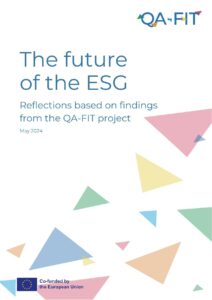High-quality higher education provision has been one of the key aims of the Bologna Process since its start in 1999, and in 2020, the Ministers responsible for higher education in the countries of the European Higher Education Area (EHEA) confirmed their commitment to quality assurance (QA) and the implementation of the European quality assurance framework, including the Standards and Guidelines for Quality Assurance in the European Higher Education Area (ESG). Today, cooperation in quality assurance within the EHEA has significantly increased, becoming one of the most successful outcomes of the Bologna Process, and the ESG are widely recognised as a valuable and indispensable common framework for developing shared criteria and methodologies.
The QA-FIT project has looked at how the ESG have been adapted to different (national and institutional) contexts, and explored how quality assurance activities are addressing recent and emerging issues, including those beyond the current scope of the ESG. A survey to gather quantitative and qualitative data was designed for each stakeholder group (institutions, QA agencies, students, and national authorities). This paper draws on the data collected with the objective of identifying and analysing commonalities and divergences in the perception of the ESG by different stakeholder groups, and the key messages that can inform the future revision of the ESG.
